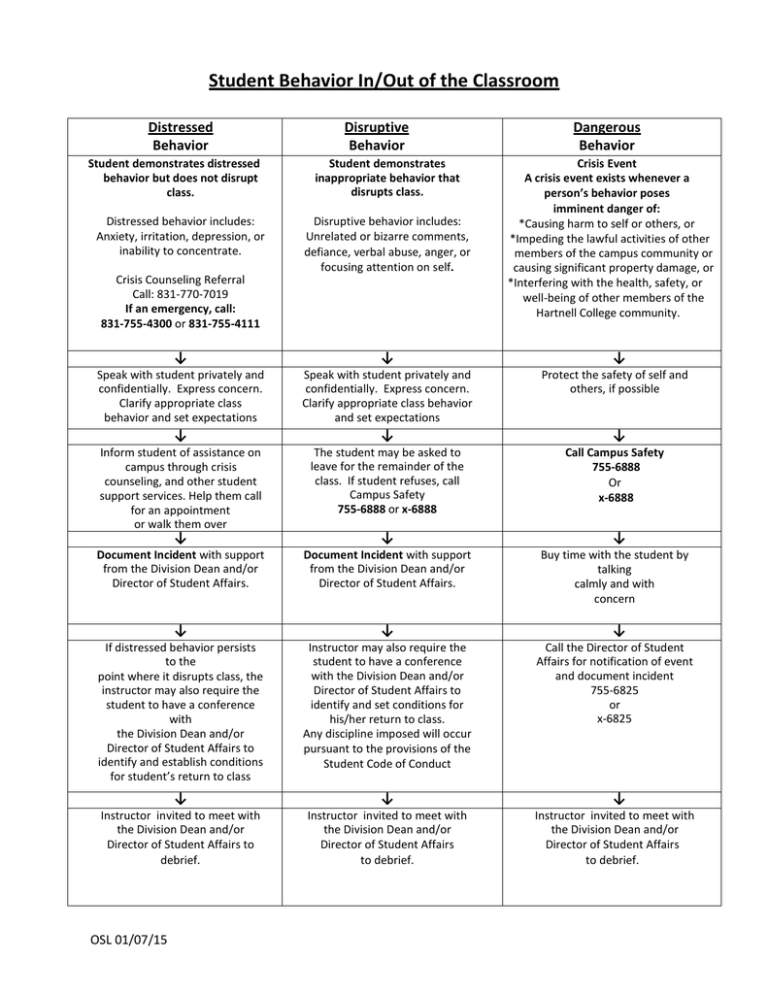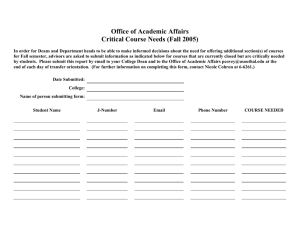
Student Behavior In/Out of the Classroom
Distressed
Behavior
Student demonstrates distressed
behavior but does not disrupt
class.
Distressed behavior includes:
Anxiety, irritation, depression, or
inability to concentrate.
Crisis Counseling Referral
Call: 831-770-7019
If an emergency, call:
831-755-4300 or 831-755-4111
↓
Speak with student privately and
confidentially. Express concern.
Clarify appropriate class
behavior and set expectations
↓
Disruptive
Behavior
Student demonstrates
inappropriate behavior that
disrupts class.
Disruptive behavior includes:
Unrelated or bizarre comments,
defiance, verbal abuse, anger, or
focusing attention on self.
↓
Speak with student privately and
confidentially. Express concern.
Clarify appropriate class behavior
and set expectations
↓
Inform student of assistance on
campus through crisis
counseling, and other student
support services. Help them call
for an appointment
or walk them over
The student may be asked to
leave for the remainder of the
class. If student refuses, call
Campus Safety
755-6888 or x-6888
Document Incident with support
from the Division Dean and/or
Director of Student Affairs.
Document Incident with support
from the Division Dean and/or
Director of Student Affairs.
↓
↓
If distressed behavior persists
to the
point where it disrupts class, the
instructor may also require the
student to have a conference
with
the Division Dean and/or
Director of Student Affairs to
identify and establish conditions
for student’s return to class
↓
Instructor invited to meet with
the Division Dean and/or
Director of Student Affairs to
debrief.
OSL 01/07/15
↓
↓
Instructor may also require the
student to have a conference
with the Division Dean and/or
Director of Student Affairs to
identify and set conditions for
his/her return to class.
Any discipline imposed will occur
pursuant to the provisions of the
Student Code of Conduct
↓
Instructor invited to meet with
the Division Dean and/or
Director of Student Affairs
to debrief.
Dangerous
Behavior
Crisis Event
A crisis event exists whenever a
person’s behavior poses
imminent danger of:
*Causing harm to self or others, or
*Impeding the lawful activities of other
members of the campus community or
causing significant property damage, or
*Interfering with the health, safety, or
well-being of other members of the
Hartnell College community.
↓
Protect the safety of self and
others, if possible
↓
Call Campus Safety
755-6888
Or
x-6888
↓
Buy time with the student by
talking
calmly and with
concern
↓
Call the Director of Student
Affairs for notification of event
and document incident
755-6825
or
x-6825
↓
Instructor invited to meet with
the Division Dean and/or
Director of Student Affairs
to debrief.
Signs of Distress
Academic Problems
• career and course indecision
• excessive procrastination
• uncharacteristically poor preparation or performance
• repeated requests for extensions or
special considerations
• disruptive classroom behavior
• excessive absence/tardiness
• references to suicide or harm to others in verbal
statements or writing
• change in personal hygiene
• dramatic weight gain or loss
• frequently falling asleep in class
• irritability
• unruly behavior
• impaired speech
• disjointed thoughts
• tearfulness
• intense emotion
Interpersonal Problems
• always asking for help with personal problems
• dependency
• hanging around office
• disruptive behavior
• inability to get along with others
• complaints from other students
• avoiding or dominating discussions
• withdrawing
Behavioral Problems
• difficulty concentrating
• physically harming self
• destruction of property
• anxiety and panic
• inability to communicate clearly
• loss of reality contact
(e.g., hallucinations, poor thought connections)
• inappropriate responses
Common Causes of Emotional Distress
• relationship problems/break-ups
• family problems
• grief and loss
• divorce of parents
• loneliness
• academic pressure or failure
• serious illness or injury
• difficulty adjusting to college life
• anxiety
• eating disorders
• difficulty adjusting to American culture
What You Can Do
• sexual or physical abuse or assault
• identity confusion
• depression
• drug/alcohol abuse
• career indecision
• loss of goal or dream
• low self-esteem
• unplanned or undesired pregnancy
• language barriers
• financial issues
A faculty or staff member is often the first person to recognize when a student is in distress and to reach
out to that student. Faculty and staff are not expected to provide personal counseling to students.
Rather, faculty and staff play an important role in encouraging students to use campus resources,
including facilitating a referral to Crisis Counseling, the Department of Supportive Programs and
Services, and the Office of Student Life. We encourage you to speak directly to students when you sense
that they are in academic or personal distress. Openly acknowledge that you are aware of their distress,
that you are sincerely concerned about their welfare, and that you are willing to help them explore their
options.
OSL 01/07/15

